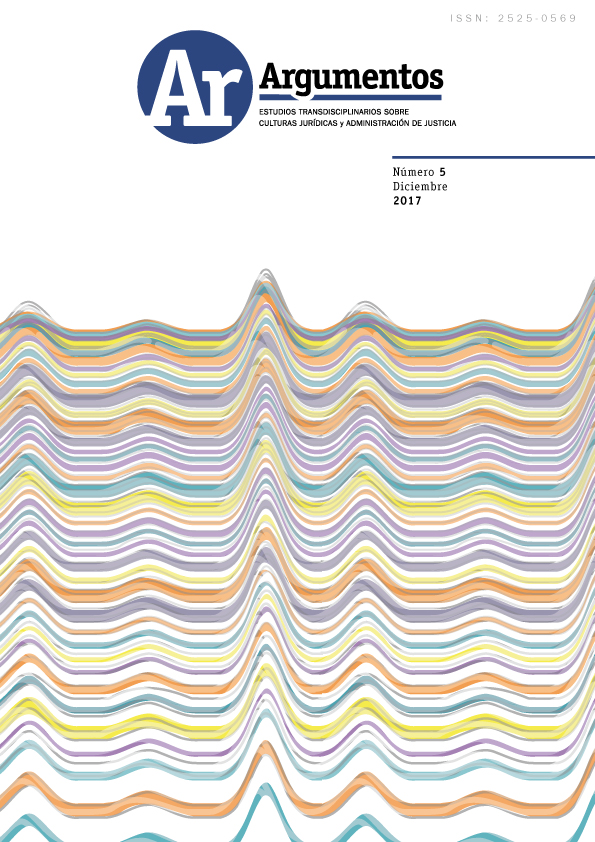The Verification of the Normative Statement of Attribution of Generic Causation in the Environmental Judgments
Keywords:
Tort Law, Causality, Scientific Knowledge, Assessment of the EvidenceAbstract
The paper proposes to analyze the complexity of the task of verifying the normative criteria that must present the link that joins two facts and, whose verification, will allow to conclude that the first was the cause of the second. It dwells on the study of scientific evidence, with particular reference to the justification of the configuration of a generic causal nexus. Some contributions of the legal literature of the United States are highlighted, and the importance of its consideration by the jurisprudence of our country. Finally, it is emphasized the importance of a realistic view of the judge, who considers the importance of the interests at stake, when assessing the accreditation of this element of evidence.
Downloads
References
Anderson, W., Parsons, B & Rennie, D. Daubert´s Backwash (2001): Litigation-Generated Science. Journal of law Reform. University of Michigan. (35). Recuperado el 20 de marzo de 2017 de https://www.crowell.com/NewsEvents/Publications/Articles/Daubert-s-Backwash-Litigation-Generated-Science-34-4-Mich-J-L-Ref-619.
Beltrán, J. (2015). La Prueba de la Causalidad en la Responsabilidad Civil. En Analisi e diritto: ricerche di giurisprudenza analítica. Recuperado el 15 de marzo de 2017 de http://www.ijf.cjf.gob.mx/cursosesp/2016/valorpruebapresencial/modulo/ModIII/La%20prueba%20de%20la%20causalidad%20en%20la%20responsabilidad%20civil.pdf.
De Luca, S., Navarro, F. & Camerierre, R. (2013). La Prueba Pericial y su valoración en el Ámbito Judicial Español. En Revista Electrónica de Ciencia Penal y Criminología. Recuperado el 01 de marzo de 2016 de http://criminet.ugr.es/recpc/15/recpc15-19.pdf.
Ferldman, H. (1995). Science and Uncertainty in Mass Exposure Litigation. 74 Tex. L. Rev. 1. Recuperado el 16 de marzo de 2017 de http://scholarship.law.georgetown.edu/facpub/1713.
Fraigman, D., Porter, E. & Saks, M. (1994). Check Your Crystal Ball at the Courthouse Door, Please: Exploring the Past, Understanding the Present, and Worrying About the Future of Scientific Evidence. 15 Cardozo Law. Review. 1799. Recuperado el 16 de marzo de 2017 de http://repository.uchastings.edu/faculty_scholarship/132.
Gianelli, P. (1980). The Admissibility of Novel Scientific Evidence: Frye v. United States, a Half-Century Later. Columbia Law Review. (80): 1197-1250.
Haack, S. (2014). Evidence Matters. Science, Proof and Truth in the Law. Cambridge, Estados Unidos: Cambridge University Press.
Haack, S. (1999). Defending Science - Within Reason. Principia 3. Recuperado el 20 de marzo de 2017 de https://dialnet.unirioja.es/descarga/articulo/5251177.pdf.
Kitcher, P. (1995). The advancement of Science: Science without Leyend. Objectivity without illusion. Estados Unidos: Oxford University Press.
Popper, K. (1989). Conjectures and Refutations: The Grouth of Scientific Knowledge. Nueva York, Estados Unidos: Routledge.
Weed, D. (2007). The Nature and Necessity of Scientific Judgement. 15 J. L. & Pol'y. Recuperado el 02 de marzo de 2017 de http://brooklynworks.brooklaw.edu/jlp/vol15/iss1/6.



